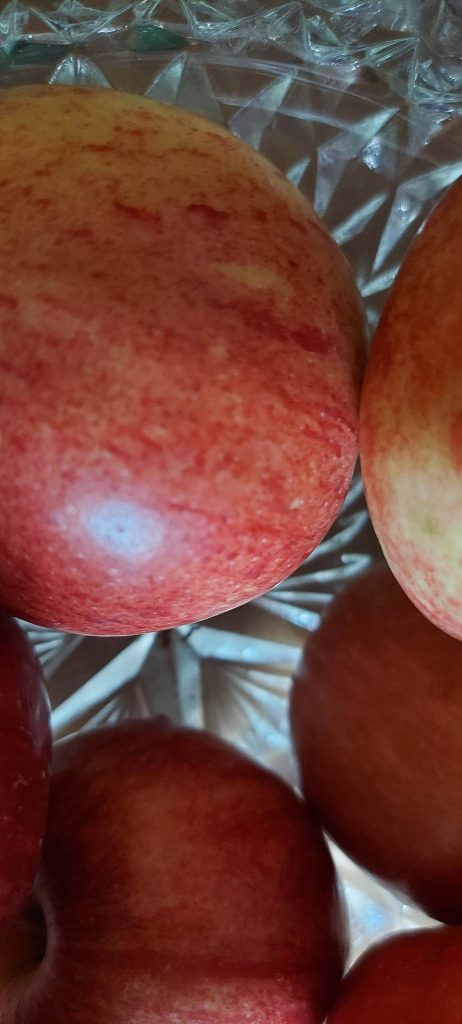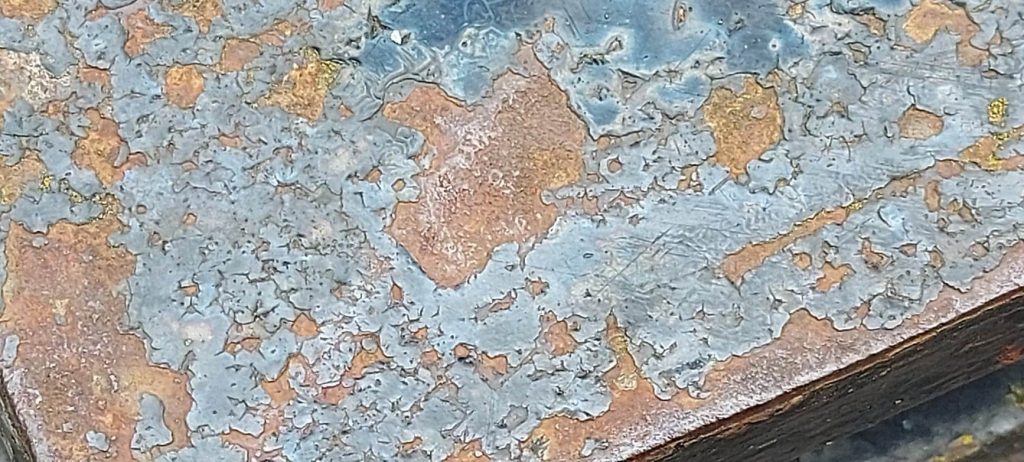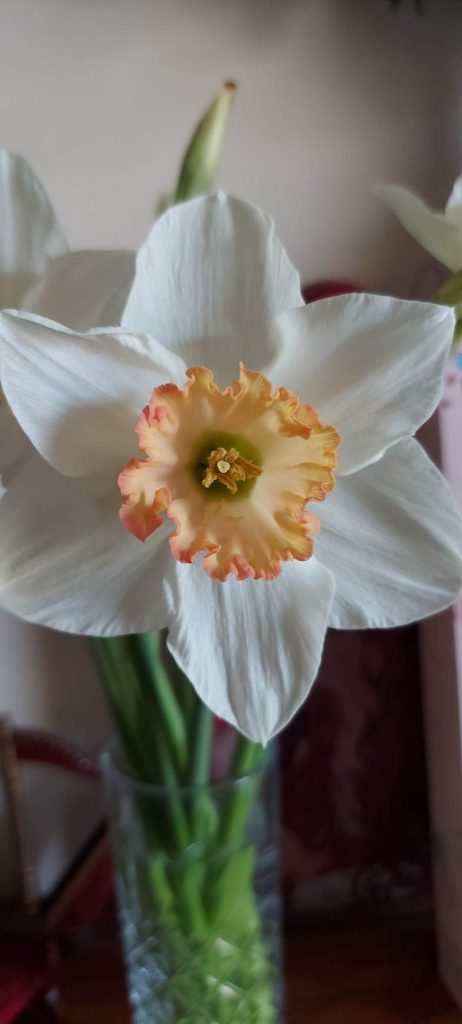
Jazz apples had caught Steve out more than once and ruined his act. Described as an exciting fusion between a Royal Gala and a Braeburn, the look of them always made him nervous. Steady up until this point, they constantly wrong-footed him and sent his logic into overload. They might be great for snacking on but they were not great for Steve’s purpose. Steve was beginning to regret that he had added them into his act. Compared to other more traditional apples, the Jazz ones were a relatively recent phenomenon. The original cross had been done in 1985 on some trees at Hawkes Bay, New Zealand and the apples had launched commercially in 2004. Coming from down under they had up-ended his logic and disturbed his equilibrium.
For days after they came into his hands he had studied their colour as a means of identification: flushes of red and maroon over shades of green, yellow and orange. It was quite a colour range to remember.
All in all, there were now 20 different varieties of apple that he had committed to memory but the more he increased the number, the more difficult it was becoming to hold them all in his head. At the local village fête, some people liked to recite the alphabet backwards at speed, but Steve was the only one who could guess at the name of a row of 20 apples by sight alone that had been placed in a certain order by a third party beforehand. He had managed this feat for several years now and was beginning to gain a reputation for his extraordinary skill but since he had introduced the Jazz apple, his luck had begun to run out. The Jazz was the joker in the pack.
He took it so seriously that he practiced for weeks before the event. Each day, his son Billy would arrange the apples in a different order and listen while his father reeled off the names, names that conjured up the fires of autumn and harvest. Sometimes Billy would act the fool and tease his father by placing a rogue apple in the pack, a rare one like the foxwhelp, a bittersharp cider apple, one of the oldest, from Gloucestershire. Steve would agonise over its identity and, finally giving in or getting it wrong, would sigh with relief when Billy told him that it was only meant as a joke and did not consist of the usual run that he was trying to remember in his head.
Guessing the names of 20 varieties of apple might seem like a feat to you or me but when you consider that there are over 2,500 different varieties in the UK alone, a spoilsport would say that it was no big deal.
When the time came, Steve was ready for the challenge. The local grocer placed each apple in its proper place and in an order that Steve did not know about. In front of each apple there was a number and all Steve had to do was to call out the name of the apple and hope that he had got it right.
No. 1 gave him no trouble at all. It was one of his favourite varieties and so he was used to seeing it every day in the fruit bowl on the kitchen table. It was a fruit packed full of juice that delivered a lot of sweetness. Its blush and its stripe was at once familiar to him. It was one of the first “bi-coloured” varieties, a characteristic now regarded as essential for sales purposes. ‘It’s a Braeburn’ he said. There was a round of polite applause.
No. 2 was a Pink Lady. Steve always referred to Pink Ladies as his blushing beauties. They were one of the first to blossom and the last to be harvested. All those hours of glorious daylight in the sunniest of places gave them a wonderful patina.
No. 3 had a stripy red skin that made him think Royal Gala.
No. 4 was a Worcester Permain, named after its place of origin.
No. 5 was causing him problems. If he couldn’t guess one immediately, he was allowed to come back to it later so he moved on quickly to No. 6. The shiny, orange-red skin with its golden background made him think it was a Kanzi or ‘hidden treasure’ in Swahili. He wasn’t entirely sure about this but he said it anyway and waited anxiously for the grocer’ response. Steve breathed a sigh of relief when he heard the word CORRECT.
He went back to No. 5 but was still unsure about it and so he passed on to No. 7. It was a striking red so he said very confidently that it was a Junami. He was doing well but there was no room for complacency. It got easier as he progressed because none of the apples he had already identified came round a second time which in turn narrowed the list of those still to come.
No. 8 was of medium size, orange-red in colour deepening to bright red and mottled with carmine over a deep yellow background. To Steve, it was easy-peasy, it could only be a Cox’s Orange Pippin. CORRECT! A round of applause followed. The adjudicator then asked the crowd to be quiet while Steve thought long and hard about the next one.
Behind him, the gymkhana was in full swing at the village fete. Further away to his right there were cake stalls, cream teas, raffles and tables brimming with home-grown vegetables. There were plenty of other competitions going on. Some children were trying to guess the number of sweets in a jar, one little girl was trying to guess the name of a doll while another one kept asking her mother if she could have a cuddly toy. It was easy for Steve to get distracted but he kept his focus all the time on the apples. By now he had guessed Discovery, Rubens and Red Prince. For some anxious moments he’d been unsure about the Kingston Black but it turned out that he had been right about that one too.
Morris dancers were dancing round the maypole. People were queueing up for the tombola. The place was getting busier and Steve was finding that his powers of concentration were beginning to wane. The audience noticed that he was taking longer to reach his verdicts on the apples lying in front of him. Sixteen down and four to go. So far so good. It would all come right in the end.
No 17 was easy. It was one that even an amateur would know at first sight, a distinctive apple with a light brown skin, dull sheen and cream freckles. Without hesitation Steve said that it was an Egremont Russet. CORRECT! Another round of excited applause.
Other distractions weighed in from time to time: some children were playing skittles while others were having a go at pinning the donkey’s tail. Every so often there was the sound of a can ‘popping off’ at ‘tin can alley’. Punters were flinging beanbags at a row of coconuts, and children hurling wellies as far as their strength could throw them.
It was time to get this apple business over and done with. No. 18 was a cinch. Its green waxy sheen was a giveaway. It was a Bramley – ideal for cooking up a culinary storm. On to No. 19. This one, by some process of careful deduction only known to Steve, was an Evelina. Everything now rested on No. 20. Steve suddenly realised that the Joker had so far not made an appearance. This, he concluded must be it. With a sense of relief and not undisguised excitement, he declared it to be a Jazz apple. CORRECT.
That just about wrapped it all up until the next time.
Neil Leadbeater is an author, essayist, poet and critic living in Edinburgh, Scotland. His short stories, articles and poems have been published widely in anthologies and journals both at home and abroad. His publications include Librettos for the Black Madonna (White Adder Press, Scotland, 2011); The Worcester Fragments (Original Plus Press, England, 2013); The Loveliest Vein of Our Lives (Poetry Space, England, 2014), Sleeve Notes (Editura Pim, Iaşi, Romania, 2016) Finding the River Horse (Littoral Press, 2017), Penn Fields (Littoral Press, 2019), and ‘Reading Between the Lines’ (Littoral Press, 2020). His work has been translated into several languages including Dutch, French, Romanian, Spanish and Swedish.
You can find more of Neil’s work here on Ink Pantry.













